Related Research Articles
Within Christianity, there are a variety of views on sexual orientation and homosexuality. The view that various Bible passages speak of homosexuality as immoral or sinful emerged in the first millennium AD, and have since become entrenched in many Christian denominations through church doctrine and the wording of various translations of the Bible.
Evangelicalism, also called evangelical Christianity or evangelical Protestantism, is a worldwide interdenominational movement within Protestant Christianity that affirms the centrality of being "born again", in which an individual experiences personal conversion; the authority of the Bible as God's revelation to humanity; and spreading the Christian message. The word evangelical comes from the Greek (euangelion) word for "good news".

The Second Great Awakening was a Protestant religious revival during the early 19th century in the United States. The Second Great Awakening, which spread religion through revivals and emotional preaching, sparked a number of reform movements. Revivals were a key part of the movement and attracted hundreds of converts to new Protestant denominations. The Methodist Church used circuit riders to reach people in frontier locations.
The Christian right, or the religious right, are Christian political factions characterized by their strong support of socially conservative and traditionalist policies. Christian conservatives seek to influence politics and public policy with their interpretation of the teachings of Christianity.
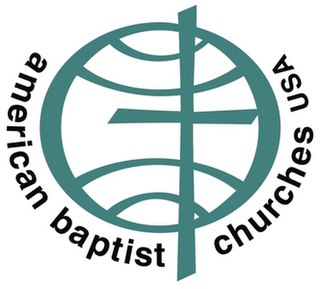
The American Baptist Churches USA (ABCUSA) is a Baptist Christian denomination established in 1907 originally as the Northern Baptist Convention, and from 1950 to 1972 as the American Baptist Convention. It traces its history to the First Baptist Church in America (1638) and the Baptist congregational associations which organized the Triennial Convention in 1814. Headquartered in Valley Forge, Pennsylvania, ABCUSA is usually considered mainline, although varying theological and mission emphases may be found among its congregations, including modernist, charismatic and evangelical orientations.
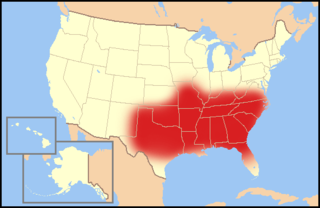
The Bible Belt is a region of the Southern United States and Midwestern United States in which socially conservative Protestant Christianity plays a strong role in society. Church attendance across the denominations is generally higher than the nation's average. The region contrasts with the religiously diverse Midwest and Great Lakes, and the Mormon corridor in Utah and southern Idaho.
The Christian left is a range of Christian political and social movements that largely embrace social justice principles and uphold a social doctrine or social gospel based on their interpretation of the teachings of Christianity. Given the inherent diversity in international political thought, the term Christian left can have different meanings and applications in different countries. While there is much overlap, the Christian left is distinct from liberal Christianity, meaning not all Christian leftists are liberal Christians and vice versa.
Nondenominational Christianity consists of churches which typically distance themselves from the confessionalism or creedalism of other Christian communities by not formally aligning with a specific Christian denomination. Many non-denominational churches have a congregationalist polity, which is self-governing without a higher church authority.

The mainline Protestant churches are a group of Protestant denominations in the United States and in some cases Protestant denominations in Canada largely of the theologically liberal or theologically progressive persuasion that contrast in history and practice with the largely theologically conservative Evangelical, Fundamentalist, Charismatic, Confessional, Confessing Movement, historically Black church, and Global South Protestant denominations and congregations. Some make a distinction between "mainline" and "oldline", with the former referring only to denominational ties and the latter referring to church lineage, prestige and influence. However, this distinction has largely been lost to history and the terms are now nearly synonymous.

Richard Duane Warren is an American Baptist evangelical Christian pastor and author. He is the founder of Saddleback Church, an evangelical Baptist megachurch in Lake Forest, California.
Dominion theology, also known as dominionism, is a group of Christian political ideologies that seek to institute a nation that is governed by Christians and based on their understandings of biblical law. Extents of rule and ways of acquiring governing authority are varied. For example, dominion theology can include theonomy but does not necessarily involve advocacy of adherence to the Mosaic Law as the basis of government. The label is primarily applied to groups of Christians in the United States.
Conservative Christianity, also known as conservative theology, theological conservatism, traditional Christianity, or biblical orthodoxy is a grouping of overlapping and denominationally diverse theological movements within Christianity that seeks to retain the orthodox and long-standing traditions and beliefs of Christianity, it is contrasted with Liberal Christianity and Progressive Christianity which are seen as heterodoxies by theological conservatives. Conservative Christianity should not be mistaken as being synonymous with the political philosophy of conservatism nor the Christian right which is a political movement of Christians who support conservative political ideologies and policies within the realm of secular or non-sectarian politics. The two major subdivisions of Conservative Christianity within Protestantism are Evangelical Christianity and Christian Fundamentalism while the Confessing Movement, Confessionalism, and Neo-orthodoxy make up the remaining within Protestantism. Theological conservatism is also found in Roman Catholicism and is also found within Eastern Christianity although neither having a direct connection with the Fundamentalist–Modernist controversy.

Russell D. Moore is an American theologian, ethicist, and preacher. In June 2021, he became the director of the Public Theology Project at Christianity Today, and on August 4, 2022, was announced as the magazine's incoming Editor-in-Chief.
Christian nationalism is a type of religious nationalism that is affiliated with Christianity, which primarily focuses on the internal politics of society, such as legislating civil and criminal laws that reflect their view of Christianity and the role of religion in political and social life.
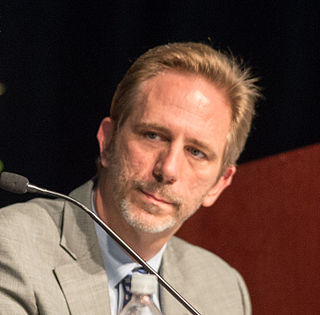
David P. Gushee, born on June 17, 1962, in Frankfurt, Germany, is a Christian ethicist, pastor, author, professor, and public intellectual. Growing up, Gushee attended and completed his college years at College of William and Mary in 1984.After college, he received his Ph.D. in Christian ethics from Union Theological Seminary in 1993. Among the titles listed, Gushee has shown hard work and dedication in different parts of his job and was awarded for his achievements. Gushee is most known for his activism in climate change, Torture, LGBT inclusion, and Post-evangelicalism.

Christianity is the most prevalent religion in the United States. Estimates from 2021 suggest that of the entire U.S. population about 63% is Christian. The majority of Christian Americans are Protestant Christians, though there are also significant numbers of American Roman Catholics and other Christian denominations such as Latter-day Saints, Orthodox Christians and Oriental Orthodox Christians, and Jehovah's Witnesses. The United States has the largest Christian population in the world and, more specifically, the largest Protestant population in the world, with nearly 210 million Christians and, as of 2021, over 140 million people affiliated with Protestant churches, although other countries have higher percentages of Christians among their populations. The Public Religion Research Institute's "2020 Census of American Religion", carried out between 2014 and 2020, showed that 70% of Americans identified as Christian during this seven-year interval. In a 2020 survey by the Pew Research Center, 65% of adults in the United States identified themselves as Christians. They were 75% in 2015, 70.6% in 2014, 78% in 2012, 81.6% in 2001, and 85% in 1990. About 62% of those polled claim to be members of a church congregation.

Mathew D. "Mat" Staver is an American lawyer and former pastor of several Seventh-day Adventist churches who became a Southern Baptist. He is a former dean of Liberty University's law school. In 1989, he founded the nonprofit organization Liberty Counsel, where he serves as chairman. ProPublica called him "a leading Christian legal theorist."
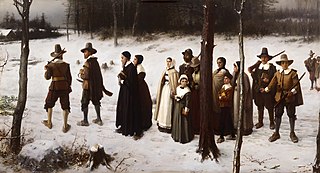
Protestantism is the largest grouping of Christians in the United States, with its combined denominations collectively comprising about 43% of the country's population in 2019. Other estimates suggest that 48.5% of the U.S. population is Protestant. Simultaneously, this corresponds to around 20% of the world's total Protestant population. The U.S. contains the largest Protestant population of any country in the world. Baptists comprise about one-third of American Protestants. The Southern Baptist Convention is the largest single Protestant denomination in the U.S., comprising one-tenth of American Protestants. Twelve of the original Thirteen Colonies were Protestant, with only Maryland having a sizable Catholic population due to Lord Baltimore's religious tolerance.
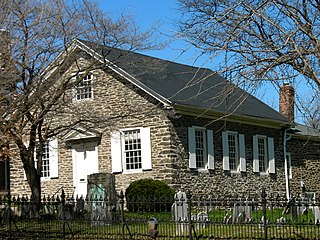
In the United States, evangelicalism is a movement among Protestant Christians who believe in the necessity of being born again, emphasize the importance of evangelism, and affirm traditional Protestant teachings on the authority as well as the historicity of the Bible. Comprising nearly a quarter of the U.S. population, evangelicals are a diverse group drawn from a variety of denominational backgrounds, including Baptist, Mennonite, Methodist, Pentecostal, Plymouth Brethren, Quaker, Reformed and nondenominational churches.

Robert James Jeffress Jr. is an American Southern Baptist pastor, author, radio host, and televangelist. He is the senior pastor of the 14,000-member First Baptist Church, a megachurch in Dallas, Texas, and is a Fox News Contributor. His sermons are broadcast on the television and radio program Pathway to Victory, which is broadcast on more than 1,200 television stations in the United States and 28 other countries, and is heard on 900 stations and broadcast live in 195 countries. He describes himself as "Trump's Apostle", and the majority of his national television appearances are political in nature rather than religious.
References
- ↑ Challis, Mallory (January 4, 2023). "Interpreting the recent dramatic decrease in American teen pregnancy rates". Baptist News Global. Retrieved January 10, 2023.
- 1 2 Burge, Ryan (October 26, 2021). "Why 'Evangelical' Is Becoming Another Word for 'Republican'". The New York Times. ISSN 0362-4331 . Retrieved 2023-01-10.
- ↑ Smith, Peter (December 3, 2022). "Nonreligious voters wield increasing clout in Democratic base". Los Angeles Times. Retrieved January 10, 2023.
- ↑ Staff (October 14, 2022). "Dr. Ryan Burge to lead new center on faith & society". Religion News Service. Retrieved January 10, 2023.
- ↑ Burge, Ryan (April 16, 2021). "It's Not Just Young White Liberals Who Are Leaving Religion". FiveThirtyEight. Retrieved January 10, 2023.
- 1 2 Brumley, Jeff (September 14, 2022). "Burge: Churches should brace for the downsizing still to come". Baptist News Global. Retrieved January 10, 2023.
- ↑ Walker, Andrew; Burge, Ryan (June 1, 2022). "Is 'Evangelical' a Historical, Theological, or Political Identity?". The Gospel Coalition. Retrieved January 10, 2023.